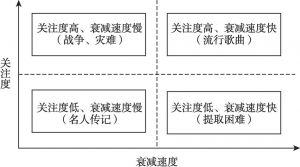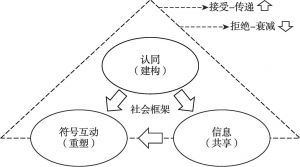章节
集体记忆传递的社会心理逻辑
摘要
集体记忆不仅是被共享的、存在于某个共同体中的个人记忆,而且是允许被社会成员所获取的符号系统。社会运行受集体记忆维护,而集体记忆传递又受社会框架维持。若将集体记忆看作一种社会心理现象,则需同时包含心理过程以及社会过程:首先,个体记忆需在社会发展过程中通过各种媒介记述和传递成为历史的一部分;其次,集体记忆同样涉及大脑对信息的编码、存储与提取过程。从社会心理学视角出发,集体记忆可根据其受群体关注的程度和衰减速度两个特征进行划分,并认为其传递过程是基于接受或拒绝信息的筛选过程。因此,将集体记忆研究全然“去心理化”或“去社会化”并不利于对集体记忆研究的拓展,探究集体记忆如何在社会中传递需要补充社会心理学在这一领域的可能性尝试。
检索正文关键字
章节目录
- 一 引言
-
二 基于社会信息传播的集体记忆共享
- (一)信息的社会属性与协作记忆范式
- (二)社会共享的提取诱发遗忘范式
- 三 基于符号互动的集体记忆重塑
-
四 基于认同建构的集体记忆传递
- (一)自我认同与集体记忆易提取性
- (二)社会认同与集体记忆稳健性
- (三)基于国家认同的集体记忆建构
- 五 集体记忆社会传递过程模型
- 六 讨论与展望
相关文献
查看更多>>>



